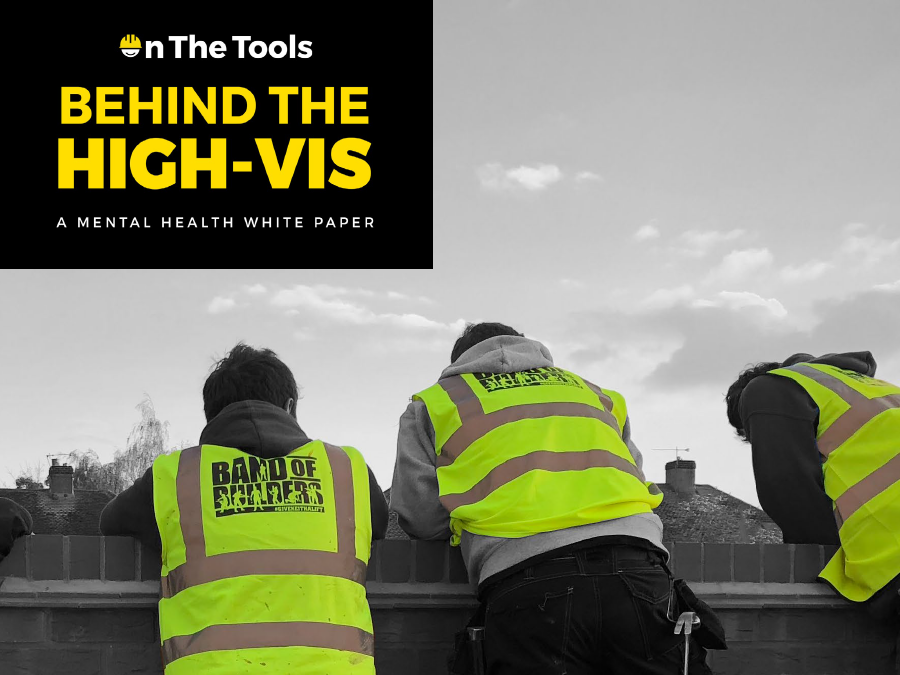
Mental Health in Construction
Recognizing this critical and often overlooked issue, On The Tools has produced this mental health white paper. This report aims to shed light on the scale, underlying causes, and far-reaching effects of mental ill health within the construction sector, as well as identify those most at risk and the support available. By including powerful first-hand accounts from tradespeople, this white paper seeks to provide a real understanding of the challenges faced. Ultimately, it puts forward informed recommendations to drive meaningful change and reduce the prevalence of this issue.
The report, published in March 2023, found that 93% of UK tradespeople have been impacted by mental ill health in some way, with 73% of all UK tradespeople surveyed experiencing mental ill health right now or in the past. A further 20% hadn’t personally experienced mental ill health but knew another tradesperson who had.
Worryingly, a large majority – 62% – of UK tradespeople surveyed have experienced anxiety. This highlights the significant mental health challenges within the industry, which can be influenced by age, the specific trade, gender, years of employment, and level of seniority. It's concerning that half of those struggling with mental ill health are in mid-level roles, and alarmingly, 100% of surveyed general builders/multi-trades reported experiencing depression and/or anxiety.
Mental Health in Construction Marginalised Groups
The UK Government's definition of marginalised groups includes ethnic minorities, women and girls, people with physical and mental disabilities, and LGBTQIA+ people.
According to the report, 27% of UK tradespeople surveyed consider themselves to belong to one or more marginalized groups. Of those experiencing mental ill health, 37% identified as belonging to one or more marginalized groups.
Key findings from the report include:
- Neurodivergence: The highest proportion of people who identified as belonging to marginalized groups reported having a mental disability or neurodiverse condition (11%), followed by a physical disability (5%). The report indicates that 71% of UK tradespeople surveyed consider themselves to have neurodiverse conditions, including autism and ADHD. The report also suggests that neurodivergent UK tradespeople are more likely to experience mental ill health than neurotypical tradespeople.
- Women: The report by On The Tools found that 100% of UK tradeswomen surveyed reported experiencing mental ill health, compared to 72% of their male counterparts. UK tradeswomen surveyed were also 28% more likely to experience mental ill health than UK tradesmen.
- LGBTQIA+: 80% of UK tradespeople surveyed who identified as LGBTQIA+ reported experiencing mental ill health.
Causes and Impact
The weight of financial pressures is a primary concern, directly impacting the mental well-being of 65% of tradespeople. The nature of the work itself can also take a toll, with lone working significantly increasing vulnerability. A staggering 84% of tradespeople who work alone reported experiencing mental ill health, predominantly depression and anxiety.
The impact of these struggles is evident in the high rates of low motivation (69%) and the concerning statistic that 64% of UK tradespeople surveyed have turned to drugs and/or alcohol as a way to cope with their mental health symptoms. Beyond the personal toll, absenteeism due to mental ill health costs the construction industry nearly £2.75 billion each year.
The full report
Please note that Behind the High-Vis: a Mental Health White Paper contains sensitive topics about mental health: including suicide, drug and alcohol misuse, and more. Read at your discretion.
Click on this link to view the full report
Click on the categories below to find out more about:

Connect with Us
Share this Page
More Posts
Recent Posts
- Breathe Easy, Work Safe: The RPE Every Site Worker Needs
- From Site to Strategy: Simon Mead Promoted to Associate Director at SC4
- SC4 named Cala Contractor of the Month, October 2025
- Why is Neurodiversity so important in Construction?
- Our Favourite Carpentry Project Of 2024: Cromwell Court, Old Basing
- Case Study: Timber Frame Installation in Netley Grange, Southampton